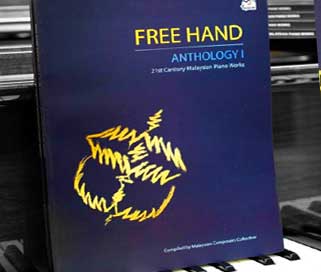Meet Vivian Chua, one of the composers from the Malaysian Philharmonic Orchestra's (MPO) first ever Forum for composers in March 2003. An active composer and arranger particularly of local folk songs, Chua most recently wrote `Mercu Kegemilangan' for large orchestra and choir, a commission by the MPO to commemorate their 20th year of formation.
A chamber version of the work was toured around the country and in Singapore, and also performed at the Asian Composers League opening concert in Taiwan in 2018.
Chua talked to conductor, music educator, vocalist, pianist, and composer Tracy Wong on her blog last year on the local choral music scene and composing as a Malaysian.
What do you feel is the Malaysian identity in choral music?
I am still trying to define what constitutes a Malaysian identity in both instrumental and choral music. For me, the obvious influences are those of the races living in Malaysia - Malay, Chinese, Indian and Eurasian races in the Peninsular as well as the East Malaysian ethnicities which are numerous and as of yet not as exposed or researched as much as those of the Peninsular. And now with the global exposure we have in Malaysia, I believe western classical styles are incorporated into compositions and arrangements here in Malaysia.
I suppose one form of Malaysian choral singing would be the dikir barat, with the call and response style. The call is done by a soloist and the response by a group in unison.
What do you feel is your role as a composer? What do you advocate for?
I compose in an organic and instinctive way, mostly when I am inspired by a story or a motif. I build on patterns and am inspired by interesting and unusual harmonies which aren’t predictable. I actually write simply on a personal and abstract idea and not necessarily to convey a political or social message. I like storytelling and evoking responses from my listeners, whatever that may be for them. I enjoy creating beautiful and sometimes unusual harmonies, moving melodies and giving fresh takes on any musical ideas.
I am also a teacher, so sometimes that also informs how I compose if I am writing something for learning. It is in my role as a teacher that I advocate music as essential in developing young minds. I think about what I want a student to learn, and incorporate that in an interesting way.
How does your lived experience as a Malaysian inform your compositional writing & output?
 |
| Chua at a rehearsal at ACL Festival Taiwan. |
But as a Malaysian, I still want to put a Malaysian identity to it, so I incorporate elements like the pentatonic scale for the themes but with western harmonies including jazz, or use Malaysian traditional dance rhythms to simple western classical themes. I like to use both eastern and western influences in a tasteful way to express my perspective of what I think is exciting and fresh music.
Admittedly I would like to explore and study more of our traditional Malaysian music to better understand it for future compositions.
What are the gaps/challenges in the Malaysian choral music landscape that you feel needs to be addressed?
I think the gaps/challenges in Malaysian choral music is the same for the general music landscape. We need to cultivate the appreciation of the arts in people such as educators, parents and policy-makers as they are in positions to support the growth of music.
Firstly, we need good education that provides exposure and openness to questioning what you are learning or taught, to have the freedom to have original thought and to be curious. It must also allow for a hard look at our history and culture, both the good and the difficult. These are needed to cultivate originality and the courage to have a voice. Composers and musicians must understand their history, language and craft well to create and express works with conviction.
This means we need good training for teachers to inspire the next generation. Then, there is the financial support needed from schools to pay good teachers reasonably to teach their students, and support from parents to allow their children to work on their music.
In terms of skills, we have more diversity and originality in recent years with more Malaysians having studied and lived abroad and then coming back to Malaysia, and sharing their ideas with their music students. There is also the accessibility of expatriate musicians working here to allow more students to gain that knowledge without needing to go abroad, which helps raise the level of music appreciation and learning locally.
Another challenge is for children to have time to explore music on their own and not simply be spoonfed for the quickest results. That helps in the short term, but not necessarily cultivate a deeper understanding in the longer term. It might result in copying rather than innovating unless the student is fortunate enough to be able to make his or her own discoveries due to their passion and interest.
How is Malaysian choral music unique/special to you?
Although I haven’t written many choral works myself and can’t say much about this, I think we have a large pool of potential material to sing about, drawing from our rich ethnic heritage here, and I find that quite exciting. I like to compare our music with what we have done with our Malaysian food and how we all enjoy them regardless of the food’s origin. There’s still much to explore and create since I think we haven’t delved deeply yet into the traditional songs of Borneo which are passed on orally.
This interview was published on tracywongmusic.com in September 2020








0 Comments